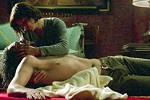 SHADOWS ARTHOUSE FILMS ’05
SHADOWS ARTHOUSE FILMS ’05< < M O R E | M O R E > >
last update 30.Oct.05
See also: SHADOWS FILM FESTIVAL | SHORT FILMS
 R E V I E W B Y R I C H C L I N E
R E V I E W B Y R I C H C L I N E
 Dutch filmmaker Stokman was piqued by those familiar words at the beginning of 1975's Dog Day Afternoon, so he looked into the "true story" of that fateful day. And the resulting documentary is almost as riveting as the feature film.
Dutch filmmaker Stokman was piqued by those familiar words at the beginning of 1975's Dog Day Afternoon, so he looked into the "true story" of that fateful day. And the resulting documentary is almost as riveting as the feature film.
In August 1972, John Wojtowicz (played in the movie by Pacino) and his friend Sal (played by Cazale) robbed a Brooklyn bank, leading to a siege that stretched to 14 hours of hostage threats and cop negotiation. Eventually it emerged that Wojtowicz was trying to get money to pay for a sex change operation for his boyfriend Ernie Aaron (aka Liz Eden).
In addition to extensive photos and news footage, Stokman interviews with the surviving cops and witnesses, plus Wojtowicz's ex-wife Carmen and Dog Day Afternoon filmmakers Lumet and Pierson, who talk about how the events were adapted for the film. We also see a lot of clips from their film, which eerily matches the news images, right down to Pacino's striking resemblance.
Where this film takes on a life of its own is in Stokman's dealings with Wojtowicz, which are interlaced with the chronology of the bank robbery and arrest. We see Wojtowicz in TV interviews during his time in jail and immediately after his release. And we hear his phone conversations with Stokman, during which he insists on being paid increasingly large sums for his cooperation (he clearly doesn't know or care that indie docs never make money). The resulting dialog gives us a striking taste of what the police negotiations must have been like.
This double plot-layering vividly depicts one quoted comment that this "truth is so strange, it's super-fiction". Stokman's approach is skilfully inventive, visually striking and hugely engaging. Several sequences are remarkably involving, such as Pierson talking about how a scene he made up in the script almost cost Wojtowicz his life while in prison, followed by a recent event at which the two men met for the first time. With priceless footage like this, Stokman creates a version of the story that's probably as close to the truth as we'll ever get. Yet we're still watching a movie.
with John Wojtowicz, Walter Stokman, Sidney Lumet, Frank Pierson, James Murphy, Joseph D'Angelo, Carmen Wojtowicz, Josephine Tutino, Dolores Goettisheim, Liz Eden, Al Pacino, John Cazale
 release UK 27.Oct.05 lff
release UK 27.Oct.05 lff05/Netherlands 1h15


29.Oct.05 lff
 R E V I E W B Y R I C H C L I N E
R E V I E W B Y R I C H C L I N E
 If you've seen anything by the Dardenne Brothers (most notably Rosetta), you will recognise their style in this naturalistic Irish drama about travellers (aka gypsies). It's technically astute, and opens the door on a rather shocking situation, but it's a bit dull and repetitive.
If you've seen anything by the Dardenne Brothers (most notably Rosetta), you will recognise their style in this naturalistic Irish drama about travellers (aka gypsies). It's technically astute, and opens the door on a rather shocking situation, but it's a bit dull and repetitive.
Winnie is a 10-year-old living with her mother Rose and nine or so siblings in a series of trailers alongside a Dublin road. While inventively prowling for supplies, they have a constant stream of visitors: council employees trying to find them a permanent home, social workers concerned about the kids' health and schooling, government lackeys trying to get them to move, friends and relatives who might be able to help. Amid all this Winnie's childhood is fairly relaxed; she barely seems bothered when she gets in trouble for fighting in school, or when she gets caught shoplifting.
This moral relativism is perhaps the film's most intriguing aspect. These people are indeed victims of society, and they have little choice but to steal to survive. But it's terrifying to think of all these children being raised without any moral compass at all. Their life is pretty much like any other kid's--playing sport, going out on the town, exploring the shops, thinking about their future and, ahem, dodging the law. But they're fairly insulated, due to a combination of their style of living and the awful prejudice of the people around them. One hilarious scene involves the girls getting all dolled up to go out one night. But to do what?
The only plot involves an eviction letter Rose receives, telling her she must vacate the location and move 200 yards up the road to a muddy field with no running water. False promises and blatant betrayal are the tactics the council uses to get these people off their hands, and it's seriously disturbing. Yet the filmmaker still manages to find flashes of hope through the brightly shot, intimate and artful filming style. On the other hand, a little more story might have held our interest more strongly than this meandering slice of life.
scr Perry Ogden, Mark Venner
with Winnie Maughan, Rose Maughan, Rosie Maughan, Paddy Maughan, Leroy Maughan, Dan Maughan, Kate Maughan, Margaret Maughan, Michael Collins, Helen Joyce, Abbie Spallen, Brian Dignam

release UK 17.Feb.06
05/Ireland 1h27
TORONTO FILM FEST
LONDON FILM FEST
31.Oct.05 lff
 R E V I E W B Y R I C H C L I N E
R E V I E W B Y R I C H C L I N E
 MUST-SEE
MUST-SEE
 From gifted Italian filmmaker Salvatores (I'm Not Scared), here's another gripping and intensely personal thriller that continually subverts expectations. It's hugely entertaining, and easily one of the finest European films of the year.
From gifted Italian filmmaker Salvatores (I'm Not Scared), here's another gripping and intensely personal thriller that continually subverts expectations. It's hugely entertaining, and easily one of the finest European films of the year.
Giorgia (Baraldi) is a private detective working for her dad (Burruano), trailing philandering women with her chatty sidekick (Germano). Then suddenly her past comes back to haunt her: she receives a box of video diaries made by her actress wannabe sister Ada (Zanella), who committed suicide 16 years ago. Watching them, she becomes obsessed with explaining Ada's death, tracking down an old friend (D'Elia) and lover (Diana) and trying to figure out the identity of Ada's mystery man. Meanwhile, Giorgia's being wooed by a cop friend (Renzi) and a sexy artist (Alberti).
This film is so engaging that we thoroughly immerse ourselves in the complexities of the playful, fiendishly clever script, which is laced with references to filmmakers from Bertolucci (the title's a quote from Last Tango in Paris) to Fritz Lang, via Truffaut, Fellini, Fassbinder, Antonioni and Hitchcock. But that's just texture in a striking and compelling tale of a woman finally dealing with who she is in relation to her family.
Salvatores tells the story in such a lively way that we can't help but be drawn into both the personal drama and the puzzling whodunit. Flashbacks, film clips and video diary entries add a lush visual quality to the film, as does Salvatores' inventive use of light and colour. The more we find out about Ada and Giorgia, the more we want to know. And the filmmakers never let us down. Neither does the fine cast. Baraldi is especially good--bristly and mercurial, funny and warm, terrified and unwavering.
This is strong, witty, charming moviemaking that combines a central mystery with an even more involving personal odyssey that examines deeply resonant themes. "Be careful," one character warns Giorgia. "You can't play with the past, especially if doesn't belong just to you." As events and scenes start echoing and circling, moments of sudden humour and emotion really catch us, and the characters, by surprise. Simply superb.
scr Gabriele Salvatores, Fabio Scamoni
with Angela Baraldi, Gigio Alberti, Andrea Renzi, Elio Germano, Claudia Zanella, Luigi Maria Burruano, Alessandra D'Elia, Bebo Storti, Rino Diana, Ylenia Malti
 release It 27.May.05, UK 12.May.06
release It 27.May.05, UK 12.May.0605/Italy 1h42

31.Oct.05 lff
 R E V I E W B Y R I C H C L I N E
R E V I E W B Y R I C H C L I N E Cuore Sacro
Cuore Sacro
 Stylish Turkish-Italian filmmaker Ozpetek is back with another elegant and emotional drama centring on a woman confronting her inner demons. There's a lot going on in this film--maybe too much--but it's a lovely examination of faith and responsibility.
Stylish Turkish-Italian filmmaker Ozpetek is back with another elegant and emotional drama centring on a woman confronting her inner demons. There's a lot going on in this film--maybe too much--but it's a lovely examination of faith and responsibility.
Irene (Bobulova) is a fiercely successful businesswoman who discovers just how fierce she is when two friends commit suicide after one of her rather harsh acquisitions. Her newly introspective mood comes to a full boil when her next project turns out to be converting her childhood home into a block of trendy apartments. As skeletons emerge from the family closet, she's befriends a street urchin (Comencini), a priest (Poggio) and a deranged homeless guy (Di Stefano). Her aunt/business partner (Gastoni) is not amused.
Ozpetek creates a vivid, lush tone that carries us through this deeply contemplative story as Irene struggles to make sense of where she came from, who she really is and what she should be doing with her life. This is a film jammed with big ideas about justice, humanity and spirituality, especially as it begins to hint that Irene might be a saint. This style of filmmaking is extremely involving and provocative, although it also feels somewhat heavy-handed and lethargic.
Bobulova gives a terrific performance that's gently understated and sharply thoughtful. Her interaction with the other characters is riveting and extremely telling, and at times we see straight into her soul. Her odyssey is so intensely singular that we don't necessarily identify with her, although the film as a whole highlights such vitally important issues that we can't help but see ways, however small, that we could make a difference in the world around us.
Films about themes like mysticism, guilt, conscience, charity and redemption aren't exactly commonplace, so Ozpetek's soul-searching approach is more than welcome, even if he seems to wallow it in far too much. As it drags on a bit, the film still remains riveting from start to finish--powerful and moving.
scr Gianni Romoli, Ferzan Ozpetek
with Barbora Bobulova, Lisa Gastoni, Andrea Di Stefano, Massimo Poggio, Camille Dugay Comencini, Luigi Angelillo, Erika Blanc, Caterina Vertova, Stefano Santospago, Michela Cescon, Elisabetta Pozzi, Stefania Spugnini
 release It 25.Feb.05,
release It 25.Feb.05,UK 31.Oct.05 lff
05/Italy 1h56
David di Donatello Awards
(won Best Actress and Production Design)
30.Oct.05


See also: SHADOWS FILM FESTIVAL | SHORT FILMS
© 2005 by Rich Cline, Shadows
on the Wall